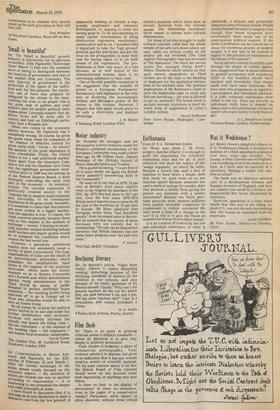Small is beautiful'
Sir: The 'Small is Beautiful' growth industry is noteworthy for its spurious economics. John Papworth ('Sovereign State' March 1) falls into the common error of failing to distinguish between the function of government and that of the market (free not Common). The only function of government is the Protection of the rights of the individual and, for this purpose, the retaliatory use of force may properly be delegated by the citizen to the state. Limiting the state to its proper role is the great task of politics and your author's plea for smaller political units makes sense. I strongly suspect that my fellow Scots will be more able to control and limit an Edinburgh parliament than a Brussels one. When one comes to the economic Sphere, however, Mr Papworth has it completely wrong. Of course, he gives the game away when he complains of an absence of effective control for given social ends." Given — by whom? His analysis of the great depression is truly remarkable. Firstly, the United States is not a vast unfettered market. Quite apart from the Interstate Commerce Act and the Sherman Anti-Trust Act the significant government intervention prior to 1929 was the setting up of the Federal Reserve Board, a state monopoly controlling the most vital Part of the economy — its monetary sYstem. The colossal expansion of politically created money in the 'twenties led to massive malinvestment and, inevitably, to its consequent hquidation in the great crash. Secondly, it is nonsense to claim that fluctuations are more violent in a bigger market. Just the opposite is true. To repeat, the crash occurred precisely because there was no free market in the medium of exchange — money. Creating economically autarkic nations sheltering behind tariff barriers and import quotas would be to reimpose the conditions which caused the last world war.
However, a genuinely unfettered market does not necessarily mean a society of giant corporations. The huge organisations of today are the result of an interventionist philosophy which subsidises the establishment lame ducks at the expense of the potential newcomer, which taxes the family business so as to finance Concordes and Chunnels and which discriminates against rising entrepreneurs in the Third World by means of tariffs designed to protect inefficient home industries — the resulting profits being Siphoned off to go in foreign aid to those who otherwise would be able to earn an honest living. By all means let us keep the political sector limited in its size and scope but further interference with economic freedom will merely increase the already vast power the ruling class — the tax consumers — at the expense of the working class — the taxpayers and hasten total economic catastrophe. David Farrer The Garden Flat, 40 Guildford Road, Stockwell, London SW8 Sir: Congratulations to Messrs Ashworth and Papworth for the EEC articles of February 22 and March 1. After the current exchanges in the Media almost totally focused on the economic aspects — the statistics of Which are twisted one way or another according to requirement — it is heartening to see presented the deeper and wider principles at stake.
1 have found in discussion that it is not easy as an anti-Marketeer to state a defensive case from the 'low ground' of apparently wishing to reverse a supposedly progressive and visionary development, i.e. arguing to come out having gone in. To be anti-anything so easily carries connotations of being obstructive, regressive, reactionary, conservative and so on. I therefore find it important to take the 'high ground' position quickly and firmly and put the onus on the protagonists to state their case for having taken us in (in both senses of the expression). The proMarketeer is then very much at a loss because, as so well stated in the aforementioned articles, there is no convincing substance to their case. One of the only possible exceptions is the suggestion that the transfer of power to a European Parliament, bureaucracy and legislation is the only way of diverting the increasingly divisive and disruptive power of the unions in this country. However, 1 suspect that this again would prove to be only a short-term and dubious advantage.
J. H. Moore 9 Denning Road, London NW3


































 Previous page
Previous page